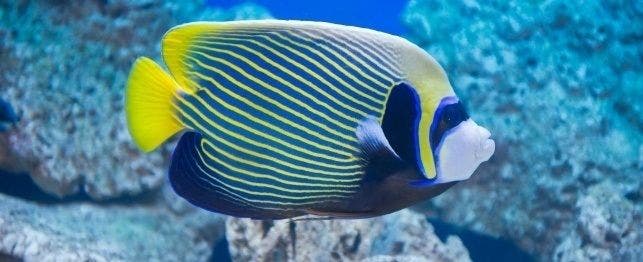
Choosing a Saltwater Angelfish
Saltwater angelfish are among the most beautiful of all reef creatures. Their colors are deep and rich and often cleverly painted by Neptune into stripes and spots. These fish are found in all the world’s oceans, although the greatest diversity of this group is found in the Indo-Pacific Ocean.
Angelfish live in rocky areas and reefs where they feast on the abundant coral. And although these species can be rather territorial, preventing you from keeping more than one of a species in a tank, they are among the most popular aquarium fish. Despite their delicate appearance, once acclimated to your tank angelfish are incredibly hardy and can be a long-time resident of your aquarium. The trick is getting them acclimated.
Housing
Angelfish are picky about space. They need lots of it. And you should anticipate that some species grow quite large – up to 16 inches. Unless you keep a small species of angel, such as a pygmy angelfish, your tank should be no less than 75 gallons if you want to keep angels. A big tank will allow the other fish to give the angel the body space it wants, maintaining peace. Water quality must be up to par with that of a coral reef tank – good circulation, good oxygen levels, low nitrates, comfortable temperatures – but the biggest problem most aquarists have in keeping angels is providing the right nutrition. These fish normally eat coral – how can you replace that?
Food
In fact, most angelfish will eat a wide variety of plant and animal material. Flake food will provide the vegetable matter (some will eat pelleted food or fresh vegetable matter, but it all depends on the species). You should provide some source of live food, at least on occasion, brine shrimp or small clams will do. Those angelfish that do eat shrimp and clams may also start snacking on any invertebrates you may have in the tank, so check your fish’s diet before you buy.
Varieties
There are many varieties of angelfish, although some are better for your tank than others. Be sure to investigate the species you decide on. Some get to be enormous while others have very strict dietary needs. Here’s a brief list of some readily available angels:
- Emperor angel. Also called the imperial angelfish (Pomacanthus imperator), the emperor angel is a favorite because of its striking coloration. However, this angel is not a good one to start with since it is a little pickier than most. They can reach sizes of up to 16 inches and therefore must be kept only in very large tanks – no less than 80 gallons – where they can roam about. They can be kept with non-aggressive fish, but be sure to have plenty of hiding spaces for everyone in case the angel gets a little moody.
- Coral beauty. It (Centropyge bispinosus) is one of the hardiest and most readily available of all angelfish. A good angel for a beginner, the coral beauty will eat just about anything but its diet should include a supply of algae. It is, like others of its kind, beautifully painted with orange and purple with red markings. It can grow to seven inches long in nature.
- Lemonpeel. This angel (Centropyge flavissimus) is a beautiful bright yellow fish donning baby blue lines around its gills and eyes. It grows to be only about three inches long. This fish isn’t recommended unless you have abundant growth of green algae, a major component of its diet. This makes the lemonpeel somewhat difficult to keep.
- Flame. This angel (Centropyge loriculus) is a hardy alternative. It is fiery red with dark markings and very well-suited for the beginner angel-keeper. It can grow to be about six inches. The flame angel also needs a little algae now and then.
- Caribbean pygmy. This angelfish (Cetropyge argi) grows to be only about three inches in length and will eat just about anything. It is a rich purple-blue fish with a bright yellow head with speckles of blue. This fish is difficult to find and quite expensive, and is one of the most beautiful of angels.
- Koran. This fish (Pomacanthus semicirculatus) is easily found and easily acclimates to an aquarium, compared to others of its kind. This angelfish will eat just about anything and seems happy doing so. Its coloration is bluish with white markings. This species can grow to be more than 13 inches long in nature, and though it won’t get that big in your aquarium, it is a space monger.